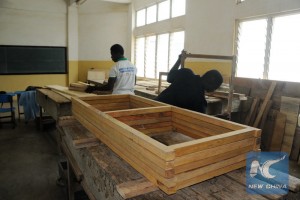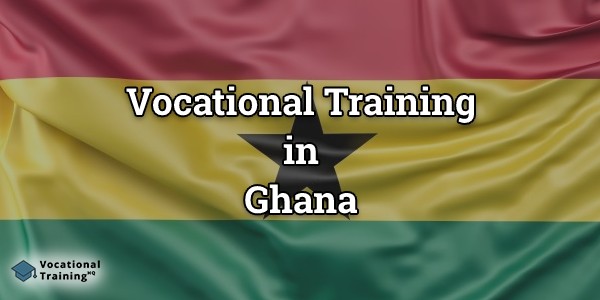There has not been much change in the educational system of Ghana from colonial times.
The system is unsystematic and has to be restructured soon, it depends solely on learning the English language.
The traditional educational system of the country ignored vocational training and education which should have been of utmost importance, as the livelihood of Ghanaian is specifically based on fishing.
They were deprived of training and practical application of knowledge.
After many years, little efforts have been put forward to bring improvements in the system.
However, Vocational training in Ghana still receives little attention.
For uplifting vocational training, the Ministry of Education is taking several steps.
It has established multiple agencies that work on the implementation of educational policies.
The ministry is supported by local authorities as well as the state government.
Article Table of Contents
Phases of Education in Ghana

The educational system in Ghana is categorized into three segments:
- Basic Education- it includes playschool, primary, and lower secondary school
- Secondary Education- it includes upper secondary and vocational training and education
- Tertiary Education- it includes colleges, training institutes, and universities
For the development of vocational training and education, the government of Ghana created two institutions.
- WDA- Workforce Development Authority, which organizes the strategies of vocational training at the national level, and
- IPRCs- Integrated Polytechnic Regional Centres, which operate on a provincial level
In Ghana, there are approx. 672 public high schools including vocational institutes and secondary schools, out which vocational institutes controlled by public sector constitute about 4.2%.
The vocational schools in private sector equal to the number of schools in the public sector and are expanding continuously.
Churches contribute over an overwhelming 80% in vocational education.
The courses of vocational training in Ghana are mostly handled by the institutes of polytechnic and certain universities.
There are 10 polytechnic institutes in Ghana.
Sectors that Need Development for Vocational Training and Education
The Central government has prioritized development of vocational training in Ghana.
This step is taken to mostly to reduce poverty and eliminate unemployment in the country.
There are many problems faced by the vocational sectors such as:
- Completion rate is very low with only 1.6% of students completing the course out of 11% taking part.
- Untrained Staff- the instructors in the institutes are not properly qualified and do not have enough knowledge to guide students.
- Shortage of Infrastructure
- No scope for practical experience and absence of training of basic skills.
In the year 2006, a council was created for TVET (Technical & Vocational Education and Training) for coordinating educational policies and eliminating all the hindrances in the development of vocational training in Ghana.
The council organized a National Youth Found for proposing a framework for vocational education in 2010.
Levels of Education in Vocational Training
There are three levels of delivering vocational education–
Basic level: The Basic Level of vocational education is provided in junior secondary school.
Secondary level: The Secondary level of vocational education begins in secondary schools, technical institutes, and vocational training and education centers.
Tertiary level: The Tertiary Level of vocational education is given in professional institutes like polytechnics and in universities at their highest levels.
Objectives of Providing Vocational Education
The main motive of providing vocational training in Ghana is to give training of practical, technical, and vocational skills to young boys and girls.
The training helps them become capable of self-employment and thus, needs of technical manpower of the country in various sectors, for example, agriculture, hospitality, business, and industry.
Given below are the functions of vocational training institutes in Ghana:
- Establish apprenticeship, internship training, and programs for training for engineering and office workers as well as provide training for instructors and officers for teaching.
- Present guidance and career growth in the vocational industry.
- Improve standards of training, and bring growth in trade testing and policies and programs of certification.
- Start a regular study of the requirements of manpower of the country at the level of skilled workers.
- To build and continue technical and vocational relations with international establishments and foreign institutes involved in activities related to vocational training.
Eligibility for Entrance to Vocational Courses and Programs
Those students who have completed their basic education are eligible for admission in senior secondary or technical institutions providing vocational education.
The duration of the technical or vocational programs is three years.
After the completion of technical education, the students can further proceed to the following courses:
- University level for pursuing degree courses
- Institute for Polytechnics
- HND courses – Higher National Diploma
- Any tertiary institute that provides courses of vocational training
Classification of Pre-Tertiary Institutes and Program
A total of 160 vocational institutes are present in Ghana with 22 technical institutes working under GES, 19 under NVTI (National Vocational Training Institute) and the rest are managed by several organizations established by the government.
In addition to the public institutions, there are over 250 private vocational institutes that are mainly operated by NGOs and Churches.
The courses covered under these institutions include theory, practical, and basic vocational training.
National Vocational Training Institute, Ghana
Representatives of government officials and workers formulated a three-party National Manpower Board in 1967 for planning effective development and application of manpower according to the requirement of national development.
The Board did a comprehensive study of manpower requirements of the country along with existing infrastructure for vocational training and decided that they needed help from the UNDP/SF- UN Development Program Special Fund for the establishment of a program for national vocational training.
The first stage of the project took four years and was approved in 1968.
After the financial assistance from the UN, a parliamentary act was passed for the establishment of the Institute for National Vocational Training.
The Institute runs a total of 34 vocational institutions present all over the country and is currently training students in around 28 skill areas.
The aim of the institution is to provide the best systems for the development of vocational training in Ghana and enhance the capacity of revenue generation.
For further information, students can visit their official website at- http://www.nvtighana.org/trainingProgrammes.aspx or http://www.nvtighana.org/Home.aspx.

Can someone tell which vocational school is the best in Ghana? Thanks
The article is insightful. However, I feel there is still a wide area to be covered when it comes to TVET in Ghana. For instance, I teach at ICCES (Integrated Community Centre for Employable Skills). It is a vocational/technical school. There are about 60 centres across Ghana. I find it interesting that such an institution did not come to the writers attention at his time of research. If it did, does it form part of the 4.2% of public vocational/technical schools in Ghana? I am currently researching on “improving training delivery in TVET schools”. A reply would help in my research.
Please I want to know what kind of secondary vocational attitude course of study does not have the basis to further admission to a college or any tertiary vocational institute
Please I need a catering program around Tema or Kpone.
While I agree with the writer about the vocational and technical education in Ghana, I disagree that the livelihood of the Ghanaian, even the majority, depend largely on fishing.
For secondary level how many years course and the bills,
for institution and Borden house?
Please, I want to known which courses in your school and materials.
Is there a course you can train for 6 months?
Good piece.
I’d like to know more, for example how institutution can charter to be called say “Chartered Institute of ……”.
Are the chartered institutions also under vocational trainingschools?
nice education system.